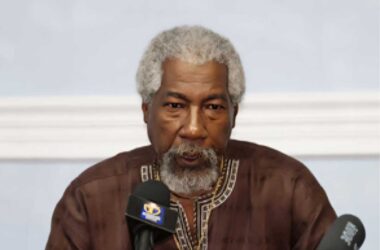Before Taiwanese voters went to the polls Saturday, I noted to all who asked that it was an election that wouldn’t really matter to Saint Lucia or any of the other four CARICOM nations with diplomatic ties with Taipei.
Never mind the ruling Democratic People’s Party (DPP) candidate having won the Presidency of the island’s local government, fact is that it’s lost its parliamentary majority to the major opposition Kuomintang (KMT) and the Taiwan People’s Party (TPP), a third force, is also now in a possible kingmaker’s role, should it decide to join with the KMT to make life hard-enough for the DPP as to oust it before the next elections in 2028.
With a set election date every four years, it’ll be difficult to force a premature election, but with the majority of seats in the island’s legislature, the KMT and TPP can eventually have all the say in what laws are passed and what aren’t – which also means the DPP will have to work with the KMT and TPP, or face not getting its plans and proposals supported, including preventing it from passing its most important bills.
The KMT is the original Taiwan party that established the Taiwan that’s existed since 1949 when Mao Zedong and the People’s Liberation Army (PLA) defeated the KMT’s army on the mainland and established the People’s Republic of China (PRC).
The KMT and DPP have been in and out of office since Taiwanese started voting in internal elections, always under the steady glare of Beijing, which has never allowed the world to forget that Taiwan (by whatever name) is part of China.
Ties with the mainland have also been shaped according to which party is in office, the KMT wanting closer non-confrontational ties with Beijing while the DPP keeps dreaming of an independent Taiwan – which none other than President Joe Biden reassured both Beijing and Taipei that the USA doesn’t support.
Beijing is naturally infuriated against those major Western governments that have congratulated the DPP on its victory at the polls, accusing them of interfering in China’s internal affairs – and it’s also reaffirmed its strong view that reunification with the mainland will be sooner than later.
Taiwan’s Caribbean allies have also expectedly congratulated the DPP on winning the presidency of the island’s government, but they too had more gum to swallow as the election ended with one more ally, Nauru, announcing it has broken ties with Taipei.
Indeed, Nauru has become the 10th independent nation to break ties with non-independent Taiwan, following on the heels of Honduras last march.
Madam Tsai took office in May 2016 and by December, Sao Tome and Principe broke ties with Taipei, followed by Panama in 2017, the Dominican Republic, Burkina Faso and El Salvador broke in 2018, Solomon Islands and Kiribati broke-off in 2019, Nicaragua broke in 2021, Honduras in 2023 – and Nauru become the first for 2024
Taiwan is now left with 12 allies, including The Vatican, but it’s declining number of friends on the world stage has strengthened its dependence on its remaining Caribbean allies, which represent nearly half of what’s left.
In fact, the Caribbean and Latin America represent more than half of Taiwan’s remaining friends in Belize, Haiti, St. Kitts and Nevis, Saint Lucia and St. Vincent & The Grenadines, Guatemala and Paraguay.
Taipei’s five remaining Caribbean allies have delivered the expected goods by way of annual support for Taiwan’s impossible objectives of gaining acceptance to United Nations (UN) agencies and Taiwan has delivered what it considers appropriate levels of support in return.
Taiwan’s requests and demands have changed with time and according to urgency, but there’s also been a visible lessening of its allies’ will to or appetite for continue kicking stones, just to upset Beijing.
Taiwan’s allies have largely chosen not to engage in the type of diplomatic ping-pong, hop-skip-and-jump types of dollar-diplomacy of the 1980s and 1990s.
But Taipei – under President Tsai — has also been more-or-less satisfied that despite no progress in site, it’s been able to keep remaining English-speaking Caribbean allies.
The DPP continues to advocate impossible Independence for Taiwan (which isn’t recognized by the UN as a nation) and maintaining a long political distance from the mainland, while the KMT advocates closer engagement with Beijing and a return to healthy cross-strait ties that existed under the KMT between 2008 and 2016 (under then president Ma Ying-jieu).
That the KMT won more parliamentary seats than the DPP could mean that it’s message of closer ties with Beijing has either been embraced by more Taiwanese voters, or that its pro-China engagement stance did not deter them from voting for it.
Madam Tsai will remain in office for the next six months in a transition until mid-May 2024, but with no guarantee of a smooth ride out after two consecutive four-year terms.
She’ll have to pave the way for her successor (the current Vice President), but will have to meet the KMT at least halfway in parliament, while praying and hoping none of its remaining 13 allies breaks ties under her watch.
Under her predecessor President Chen Shui-bian (2000 to 2008), Dominica, Grenada and Costa Rica joined Liberia, Vanuatu, Senegal, Chad and Malawi in breaking with Taipei; and under President Ma Ying-jieu, only Gambia broke ties in 2013 during his two terms (2008-2016).
Having chalked-up ten losses in eight years, Madam Tsai won’t leave office with a proud legacy — and it’s to be expected that between now and May, she’ll do much to reassure the remaining seven Caribbean and South American diplomatic allies to (at least) hold-on and allow her to complete her transition without any more blemishes.
But as with everything in life – and the life of politics – it all depends on how long maintaining ties with Taiwan will remain sustainable in today’s fast-changing world, where and when climate change and regime change intertwine in the strangest of ways at most-unexpected times.





